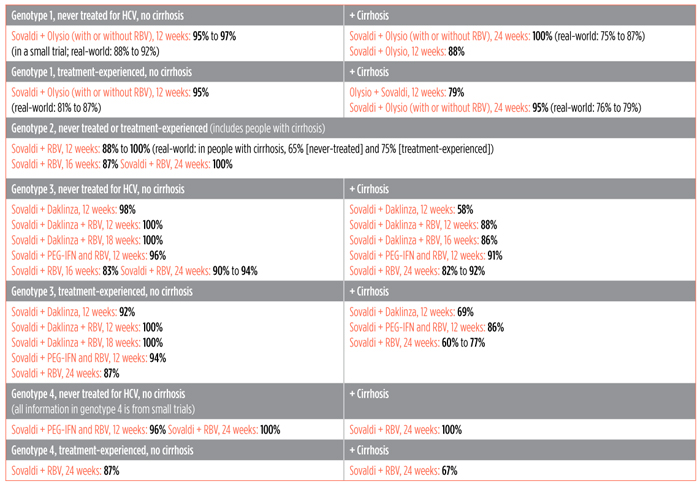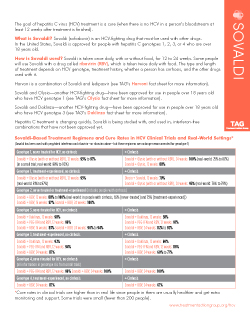Update April 2016
The goal of hepatitis C virus (HCV) treatment is a cure (when there is no HCV in a person’s bloodstream at least 12 weeks after treatment is finished).
What is Sovaldi?
Sovaldi (sofosbuvir) is an HCV-fighting drug that must be used with other drugs. In the United States, Sovaldi is approved for people with hepatitis C genotypes 1, 2, 3, or 4 who are over 18 years old.
How is Sovaldi used?
Sovaldi is taken once daily, with or without food, for 12 to 24 weeks. Some people will use Sovaldi with a drug called ribavirin (RBV), which is taken twice daily with food. The type and length of treatment depends on HCV genotype, treatment history, whether a person has cirrhosis, and the other drugs used with it.
Harvoni is a combination of Sovaldi and ledipasvir (see TAG’s Harvoni fact sheet for more information).
Sovaldi and Olysio—another HCV-fighting drug—have been approved for use in people over 18 years old who have HCV genotype 1 (see TAG’s Olysio fact sheet for more information).
Sovaldi and Daklinza—another HCV-fighting drug—have been approved for use in people over 18 years old who have HCV genotype 3 (see TAG’s Daklinza fact sheet for more information).
Hepatitis C treatment is changing quickly. Sovaldi is being studied with, and used in, interferon-free combinations that have not been approved yet.
Sovaldi-Based Treatment Regimens and Cure Rates in HCV Clinical Trials and Real-World Settings*
(Sovaldi has been used with pegylated interferon and ribavirin—or ribavirin alone—but these regimens are no longer recommended for genotype 1)

*Cure rates in clinical trials are higher than in real life since people in them are usually healthier and get extra monitoring and support. Some trials were small (fewer than 200 people).
The most important thing a person can do to be cured is not to miss taking doses of HCV treatment—called adherence. Adherence lowers the risk for drug resistance.
What is drug resistance?
Each day, HCV makes billions of copies of itself. Some of these copies are not the same as the original virus. They may have changes (called mutations) that can stop hepatitis C drugs from working. If people miss doses of their treatment, the virus gets a chance to reproduce—and some of these copies can be resistant to HCV treatment.
Some people have drug resistance even though they have never been on hepatitis C treatment—but many can be cured anyway. Most people who are not cured have resistance to one or more of the HCV drugs they’ve taken. Resistance to certain hepatitis C drugs can disappear within months. But resistance to other drugs can last for years and might prevent re-treatment from working. Some people who were treated with—but not cured by—Sovaldi have been re-treated with— and cured by—a combination of drugs including Sovaldi.
Sovaldi and age, gender, and race/ethnicity:
In clinical trials, there was no difference in cure rates by age (over 65 vs. under 65). Women were slightly more likely to be cured than men. There is not much information about cure rates by race or ethnicity because most people in the trials were white. Sovaldi and RBV are slightly less effective for black and Hispanic people versus nonblack and non-Hispanic people.
Side effects from Sovaldi:
Talk with your health care provider about possible side effects and how they will be managed. In clinical trials of Sovaldi and RBV, headache and fatigue were most common. At least 15 percent of trial participants had one or more of these side effects: nausea, insomnia, itching, anemia, weakness, rash, diarrhea, and irritability; usually, these were mild.
Does Sovaldi work for HIV-positive people?
Yes. In clinical trials, cure rates were the same for HIV-positive people.
Sovaldi and other medications:
Combining medications can increase or lower drug levels (called drug-drug interactions). Increasing drug levels can make side effects from each drug worse. If drug levels get too low, a drug can stop working, putting people at risk for drug resistance or not being cured.
Sovaldi should not be used with a medication called amiodarone because it can cause life-threatening heart problems.
Talk with your health care provider before starting or stopping medications, supplements, or herbal remedies.
There are other drugs that should be switched, stopped, or avoided while using Sovaldi. More information is available in Sovaldi’s prescribing information (https://www.gilead.com/~/media/Files/pdfs/medicines/liver-disease/sovaldi/sovaldi_pi.pdf) and at: www.hep-druginteractions.org.
Sovaldi and HIV antiretrovirals:
Sovaldi can be used with all HIV drugs except boosted Aptivus.
Storing Sovaldi:
Keep Sovaldi below room temperature (86°F).
Sovaldi in people with kidney disease:
Sovaldi can be used in people with mild or moderate kidney damage. People with severe kidney disease (eGFR<30 mL/min/1.73 m2) and people on dialysis should consult a specialist.
Sovaldi in people with cirrhosis:
HCV treatment guidelines recommend that people with serious liver damage (Child-Pugh Class B or C) be treated by a specialist. In clinical trials, Sovaldi and RBV have been used in people with Child-Pugh Class B or Class C cirrhosis or liver cancer.
Sovaldi during pregnancy, nursing, and in children:
It is not known whether Sovaldi causes harm to unborn babies. If you are pregnant or planning pregnancy, talk with your health care provider about the risks and benefits of HCV treatment. It is not known whether Sovaldi passes into breast milk.
RBV causes birth defects and miscarriage. RBV should not be used by pregnant women or by male partners of pregnant women. RBV stays in a person’s body for months, so women and their male partners should avoid pregnancy until six months after stopping RBV (for more information, see TAG’s ribavirin fact sheet).
Sovaldi and RBV are under study in children (ages 3 to 17) with HCV genotypes 2 and 3. Harvoni (Sovaldi and another drug in one pill) is under study in children (ages 3 to 18).
Access to Sovaldi:
Access may be restricted by public and private payers. The criteria differ depending on the type of coverage and the state it is issued in. Support Path is Gilead’s patient assistance program for Sovaldi. People with private insurance may be eligible for assistance with copayments. Uninsured people may be eligible for medication at no charge. Information about Support Path is available by phone at 1.855.769.7284, Monday through Friday between 9:00 a.m. and 8:00 p.m. (Eastern Time), or online at: http://www.gilead.com/responsibility/us-patient-access/support%20path%20for%20sovaldi%20and%20harvoni.
This fact sheet is current as of April 2016. Always check for updated information.

